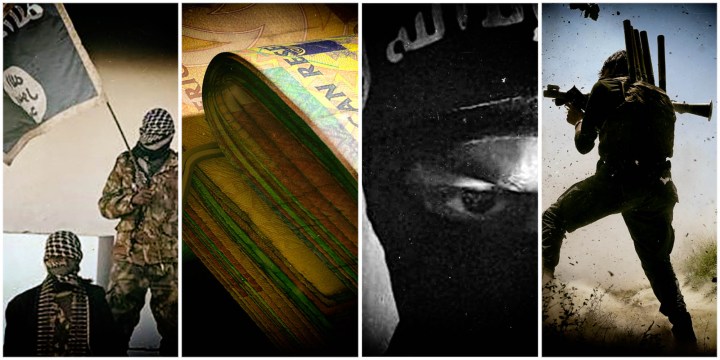GLOBAL TERRORISM
South Africa a growing conduit for Islamic State funds, says new UN report

The Islamic State in Iraq and the Levant is moving funds through South Africa to its African affiliates, a new UN report alleges.
South Africa is continuing to provoke international concern because of its allegedly expanding role as a conduit of funds from the leadership of the Islamic State in Iraq and the Levant (Isil) to its affiliates in Africa. This emerged from a new United Nations report this week which says that after Isil’s loss of its territorial caliphate in Syria and Iraq in 2016, its affiliates in Africa have emerged as among its most important battlegrounds.
The report to the UN Security Council by a team of experts monitoring Isil and Al-Qaeda says one UN member state “highlighted the emerging importance of South Africa in facilitating transfers of funds from Isil leadership to affiliates in Africa. The Monitoring Team is aware of several large transactions totalling more than $1-million.”
The experts assess that “the most vigorous and best-established Isil regional networks are those with hubs in Afghanistan, Somalia and the Lake Chad Basin.”
Although the most violent and deadly jihadist group in Somalia, Al-Shabaab, is an Al-Qaeda affiliate, the report says Isil’s Al-Karrar office in Somalia is active, covering Somalia, Mozambique and the Democratic Republic of the Congo (DRC).
The Ahlu-Sunna Wa-Jama’a (ASWJ) jihadist insurgency in Mozambique’s Cabo Delgado province has been affiliated with Islamic State (IS) for the past three years but the precise organogram is not clear. The US has previously described ASWJ — as well as the Allied Democratic Forces (ADF), which operates mainly in the DRC but also in Uganda — as affiliated with IS through “Islamic State — Central Africa Province”.
However, this week’s UN report suggests a different lineage through Somalia. But the UN authors agree with most analysts that it remains unclear whether the IS hierarchy commands and controls the ASWJ and ADF and other affiliates or whether they operate largely independently.
Farhad Hoomer
The UN report’s citation of South Africa as a growing conduit for IS funding echoes similar concerns by the US and may reflect the same circumstances. In March this year, the US slapped sanctions on four individuals in South Africa for various activities in support of IS, including financing its affiliates elsewhere in Africa. It said one of the four, Farhad Hoomer, was a recruiter, trainer and the leader of a Durban-based IS cell who “raised funds through kidnap-for-ransom operations and extortion”.
It added that Hoomer “was in contact with members of Isis-Democratic Republic of the Congo … and Isis supporters throughout South Africa”.
Read in Daily Maverick: “Red flagged: Terror-linked networks in South Africa a ticking time bomb”
Hoomer was charged in 2016 with leading an IS cell that attacked a Shi’a mosque in Verulam, KwaZulu-Natal, killing one man; planting incendiary pipe bombs in shops and kidnap-for-ransom and other offences. A magistrate later withdrew the case because it was poorly presented.
Questions have also been raised even inside the South African government about the ability and determination of the country’s law enforcement agencies to fight terrorist financing.
The Financial Intelligence Centre reported to Parliament in February that the government’s reluctance to acknowledge the existence of terrorism in South Africa “indirectly impacts on their ability to investigate and prosecute potential [terrorist financing], including to identify financing networks and other financing activities. [SA] has failed to demonstrate that [it is] effectively identifying the specific roles played by terrorist financiers.”
Isil and Al-Qaeda attacks have noticeably decreased in Europe and other regions globally over the past few years. And the UN report notes indeed that “ The threat from Isil and Al-Qaeda remains relatively low in non-conflict zones.”
But it adds that the threat “is much higher in areas directly affected by conflict or neighbouring it.” And it underscores that IS and Al-Qaeda have both decentralised many of their operations to Africa. That includes the Sahel and Somalia but increasingly also Mozambique and the DRC.
Mozambique intervention forces
In Mozambique, the report notes that since the deployment of the Southern African Development Community (SADC) and Rwandan intervention forces in July 2021 which disrupted ASWJ’s leadership, there has been “a chaotic proliferation of smaller-scale violent attacks in remote villages throughout Cabo Delgado Province. ASWJ fighters are regrouping into smaller, more mobile groups, carrying out attacks along the key corridor in Macomia that connects Macomia town to the provincial capital, Pemba.
“At the start of 2022, insurgents withdrew from Niassa Province, focusing their attacks on the northern districts of Macomia, Meluco and Mueda, with Nangade becoming the epicentre of attacks in Cabo Delgado.
“Constant attacks on villages, killings, beheadings, abductions, looting and the destruction of property have caused a mass displacement of the local population, with more than 800,000 internally displaced persons seeking refuge in neighbouring districts.”
The report notes that ASWJ has also increased its attacks across the border into Tanzania.
Despite ASWJ pledging allegiance to the new global leader of Isil, Abu al-Hassan al-Hashimi al-Qurashi, in April this year, “there is no clear evidence of ‘command and control orders’ from Isil over ASWJ,” the report says, adding that, “Isil has recently referred to ASWJ as a separate affiliate, Isil-Mozambique.”
The report says that ASWJ “lost considerable momentum in April and May” this year, for various reasons, including “impending famine as insurgents retreat in search of food and provisions, inclement weather and the Mozambique authorities calling on terrorists operating in Cabo Delgado to lay down their weapons in exchange for leniency, which led to large numbers of fighters surrendering to local forces.” DM

















 Become an Insider
Become an Insider
“A magistrate later withdrew the case because it was poorly presented.” . . .
Good grief! Are our law enforcement and prosecution ISIL sympathisers, or simply incompetent?